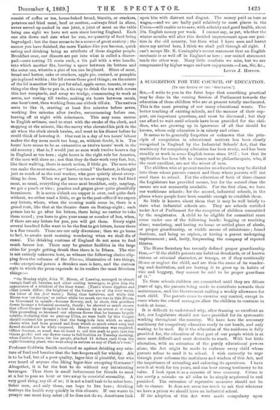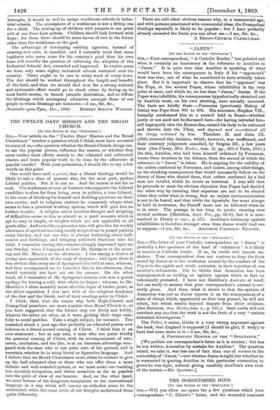A SUGGESTION FOR THE COUNCIL OF EDUCATION.
[TO THE EDITOR OF THE " SPECTATOR:]
SIR,—I write to you in the faint hope that something practical may be done in the coming Session of Parliament towards the education of those children who are at present totally uneducated. This is the most pressing of our many educational wants. The better teaching of existing schools, and the manner of their sup- port, are important questions, and must be discussed ; but they can afford to wait until schools have been provided for the chil- dren, who are growing up in ignorance of all that should be known, whose only education is in misery and crime.
It seems to be generally forgotten or unknown that the prin- ciple of compulsion in educational matters has been clearly recognized in England by the Industrial Schools' Act, that the machinery for compulsory education has been ready, and has been steadily at work in some English towns since 1857 ; but that its application has been left to chance and to philanthropists, who, if the most excellent, are not the wisest of men.
The children who at present receive no education may be divided into those whose parents cannot and those whose parents will not send them to school. For the education of both of these classes the Legislature has provided means, but for the second class the means are not necessarily available. For the first class, we have our workhouse schools ; for the second, industrial schools, in the places where people have been sensible enough to establish them.
So little is known about them that it may be well briefly to state what industrial schools are. They are schools certified under Act of Parliament for the reception of children committed by the magistrates. A child to be eligible for committal must come under one of the following heads : begging or receiving alms ; wandering, and having no home or settled place of abode, or proper guardianship, or visible means of subsistence; found destitute, and being an orphan, or having a parent undergoing imprisonment ; and, lastly, frequenting the company of reputed thieves.
The Home Secretary has recently defined proper guardianship thus,—" If the child's parents are habitual drunkards, or of known vicious or criminal character, or tramps, or if they continually ill-use or neglect the child, and are thus the cause of its wander- ing and destitution, and are leaving it to grow up in habits of vice and beggary, they cannot be said to be proper guardians of it."
To these schools children are committed until they are fifteen years of age, the parents being made to contribute towards their maintenance, and the Government making a weekly allowance for each child. The parents cease to exercise any control, except in cases where the school managers allow the children to continue to reside at home .
It is difficult to understand why, after framing so excellent an Act, our Legislature should not have provided for its systematic working throughout the country. We have here the necessary machinery for compulsory education ready to our hands, and only waiting to be used. By it the education of the residuum is fully provided for, the education of that part of our people which is at once most difficult and most desirable to reach. With but little alteration, with an extension of the purely educational powers alone, the Act might be made to embrace every child whose parents refuse to send it to school. I wish earnestly to urge through your columns the usefulness and wisdom of this Act, and the importance of extending and enforcing its operations. I have seen it at work for ten years, and can bear strong testimony to its value. I look upon it as a measure of true economy. Crime is
too costly a mistake on all sides to be simply acquiesced in and punished. The extension of repressive measures should not be left to chance. It does not seem too much to ask that wherever we have a prison we should have an industrial school.
If the adoption of this Act were made compulsory upon boroughs, it would be well to merge workhouse schools in indus- trial schools. The atmosphere of a workhouse is not a fitting one for a child. The mixing-up of children with paupers is one great evil of our Poor-Law system. Children should look forward with hope ; for them there should be some haven of rest in the future other than the workhouse or the gaol.
The advantage of developing existing agencies, instead of creating new ones, is manifest, and I earnestly trust that some legislator who cares more for his country's good than his own fame will consider the question of enforcing the adoption of this Industrial Schools' Act, extended and improved. In twelve years we have only some eighty industrial schools scattered over the country. There ought to be one in every ward of every town. The Act should be worked throughout the length and breadth of the land, and then we should find how far a strong national and systematic effort would go to check crime by drying up its most fertile source, to banish juvenile destitution, and to diffuse the blessings which accompany education amongst those of our people to whom blessings are unknown.—I am, Sir, &c.,
Newcastle-upon-Tyne, Dec., 1869. ROBERT SPENCE WATSON.



































 Previous page
Previous page